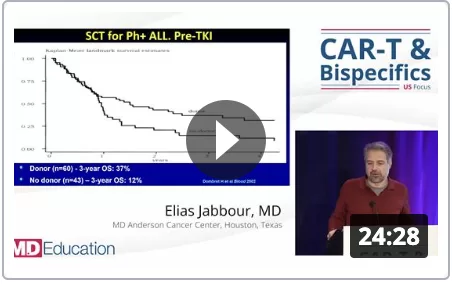Introduction to Emerging Therapies in ALL Management
Dr. Elias Jabbour shared recent developments in the treatment of acute lymphoblastic leukemia (ALL) during a recent medical conference. His presentation focused on the evolving landscape of ALL therapy, particularly emphasizing the growing importance of targeted therapies including bispecific antibodies, antibody-drug conjugates (ADCs), and tyrosine kinase inhibitors (TKIs). The integration of these therapies is reshaping the standard treatment protocols, potentially reducing reliance on conventional chemotherapy and transplantation.
The Role of Tyrosine Kinase Inhibitors (TKIs)
A significant portion of the session was dedicated to discussing the effectiveness of TKIs. Dr. Jabbour outlined the use of ponatinib in combination with the hyper-CVAD regimen, a standard treatment at MD Anderson Cancer Center. Recent trials, such as those incorporating ponatinib, have demonstrated promising results, including a survival rate of 75% at six years, which marks a substantial improvement over traditional approaches. These findings support a growing consensus that transplantation may not be necessary for all patients, particularly those achieving complete molecular remission (CMR).
Advancements in Immunotherapy
Dr. Jabbour highlighted several key advancements in immunotherapy for ALL. He discussed the impact of Alina Map and Blenatumumab, both of which have been shown to improve outcomes significantly when compared to traditional chemotherapy. For instance, the use of Blenatumumab in combination with TKIs has been associated with high rates of MRD negativity and improved survival rates. Dr. Jabbour specifically mentioned a study where sequential use of these drugs led to a survival rate of 90% at two years, indicating a potential shift towards less chemotherapeutic reliance.
Bispecific Antibodies
Bispecific antibodies, particularly those targeting CD19 and CD22, have emerged as powerful tools in treating ALL. These antibodies are designed to engage two different antigens simultaneously, enhancing their ability to recruit immune cells to kill cancer cells. Dr. Jabbour provided an overview of studies demonstrating that these therapies can lead to high response rates and durable remissions in patients.
Antibody-Drug Conjugates (ADCs)
ADCs represent another innovative approach, combining the targeting capabilities of antibodies with the cell-killing effect of cytotoxic drugs. Dr. Jabbour touched upon the use of these therapies in clinical settings, noting their potential to deliver potent anti-cancer agents directly to cancer cells, thereby minimizing systemic toxicity.
Combination Therapies and Clinical Outcomes
The integration of various treatment modalities, such as combining TKIs with bispecific antibodies or ADCs, has been a focal point of recent research. Dr. Jabbour explained that these combination therapies aim to tackle the disease from multiple angles, which can prevent the emergence of resistant mutations and enhance overall treatment efficacy. He presented data from trials where these combination strategies have resulted in better control of the disease and significantly improved patient outcomes.
Future Directions and Ongoing Research
Looking forward, Dr. Jabbour expressed optimism about the direction of ALL treatment. He mentioned several ongoing trials designed to further minimize the use of chemotherapy and improve the survival outcomes of patients. These trials are exploring the use of novel immunotherapeutic agents, more effective TKIs, and innovative combination strategies that could redefine the therapeutic landscape for ALL.
The Impact of Minimal Residual Disease (MRD) on Treatment Decisions
A key theme throughout the presentation was the importance of MRD in guiding treatment decisions. Achieving MRD negativity has become a critical goal in ALL therapy, as it is strongly correlated with improved long-term outcomes. Dr. Jabbour emphasized that newer therapeutic approaches are increasingly focused on achieving deep molecular responses, which could potentially eliminate the need for more aggressive treatments like transplantation.
Conclusion
Dr. Jabbour’s session provided a comprehensive overview of the current and emerging therapies in ALL treatment. With the integration of targeted therapies, the landscape of ALL management is undergoing significant changes, promising better outcomes with reduced treatment-related burdens. As research continues and these therapies are refined, the hope is that they will lead to more effective and less invasive options for patients battling this challenging disease.

